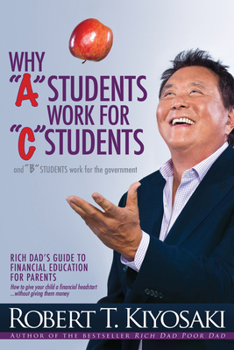Why a Students Work for C Students and Why B Students Work for the Government: Rich Dad's Guide to Financial Education for Parents
Select Format
Select Condition 
Book Overview
Kiyosaki expands on his belief that the school system was created to churn out 'Es' / Employees... those "A Students" who read well, memorize well and test well... and not the creative thinkers, visionaries and dreamers -entrepreneurs-in-the-making... those "C Students who grow up to be the innovators and creators of new ideas, businesses, applications and products. The book urges parents not to be obsessed with their kids' "letter grades" ("good grades" might only mean they or the student themselves were successful in jamming a square peg into a round hole...) and focus, instead, on concepts, ideas, and helping their child find their true genius, their special gift. The path they can pursue with a love and true passion. Robert showcases success stories of "C Students" who grew up to be phenomenal successes - and HIRED those "A Students"(attorneys, accountants, and other school-smart specialists) to work in their businesses... while the more average students, "B Students," often find themselves in government-type jobs... Not surprisingly, Kiyosaki will coin his own definitions of what "A," "B," and "C" stand for as he gives parents and their children bits of wisdom as well as insights and tools for navigating an ever-changing world... an Information Age world where the ability to change and adapt, understand relationships, and anticipate the future will shape their lives.
Format:Paperback
Language:English
ISBN:1612680763
ISBN13:9781612680767
Release Date:April 2013
Publisher:Plata Publishing
Length:224 Pages
Weight:1.20 lbs.
Dimensions:1.4" x 6.0" x 8.9"
Customer Reviews
1 rating
Ordinary people make societies great; intellectuals often bring them down
Published by bill greene , 1 year ago
The author makes many good reasons to support his claim that "C" students often end up hiring "A" students. In the process, he debunks the idea that school grades determine one's future. For example, starting and running a business enterprise requires many skills, not just school-boy smarts. The A students are sorted out for only a few skills--memorization, historical dates, quick arithmetic, proper grammar, spelling, etc. Those are useful for those who will be scientists, doctors, and engineers. But running a business requires a competency in such fields as finance, people skills, leadership, salesmanship, and organization. Readers will discover how our schools miss many of the important things needed by their students
There are many examples of ordinary average people with above average initiative, common sense, and persistence that created thriving businesses. An example is Dave Thomas, a high school drop-out, but he founded and led Wendy's massive chain of fast-food restaurants. He simply hired the accountants, realtors, and architects who were good at designing and supervising his operations, obtaining real estate locations, and creating store designs. The author describes many of the personal characteristics neede for different occupations and how they lead certain students into government jobs, and others into the hard sciences, and still others into leadership in business.
This book gives the reader a sound introduction to the types of abilities that make for success in different fields of endeavor. Anyone dealing with children and their schooling and their career plans will benefit from the information in this book. This topic is also well-covered by Thomas J. Stanley in his book "The Millionaire Mind" and "The Millionaire Next Door."






